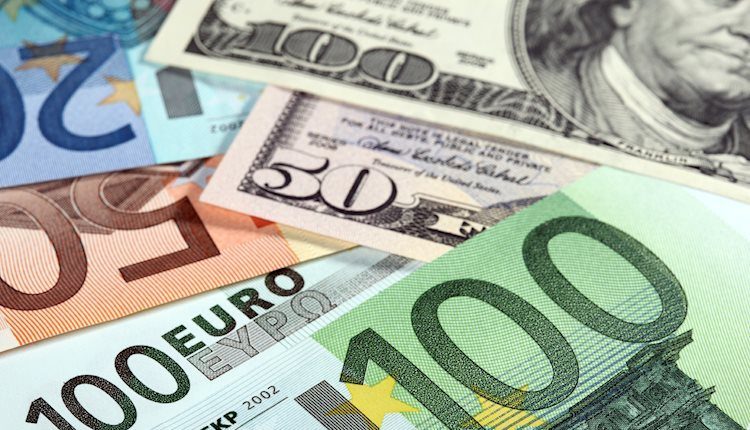- EUR/USD slips as the ECB is anticipated to implement more aggressive interest rate cuts compared to the Fed.
- German Chancellor Olaf Scholz has expressed willingness to move the parliamentary confidence vote forward by several weeks.
- The US Dollar gains ground as Trump’s fiscal policies could potentially heighten inflation risks.
The EUR/USD pair continues its decline for a third consecutive session, trading around 1.0640 during Asian hours on Tuesday. Fiscal policies anticipated under US President-Elect Donald Trump may negatively impact the European economy, adding pressure on the Euro.
Expectations that the European Central Bank (ECB) will pursue more aggressive rate cuts than the Federal Reserve (Fed) are also weighing on the Euro. The ECB is anticipated to reduce rates by 25 basis points in December, with markets projecting a decline to 2% by June. The CME FedWatch Tool currently shows a 65.3% probability that the Fed will lower rates by a quarter percentage point at its December meeting.
Politically, German Chancellor Olaf Scholz has shown openness to advancing the parliamentary confidence vote by several weeks, potentially moving it up to before Christmas. This could set the stage for an early election.
The US Dollar (USD) continues to gain strength following the confirmation of Trump’s victory in the US election. Analysts believe that if Trump’s fiscal policies are enacted, they could stimulate investment, spending, and labor demand, potentially heightening inflation risks. This could lead the Federal Reserve to adopt a more hawkish monetary policy, further supporting the Greenback.
On Sunday, Minneapolis Fed President Neel Kashkari remarked that the US economy has demonstrated impressive resilience as the Fed works to control inflation. However, Kashkari emphasized that the Fed is “not all the way home” and will need additional evidence to ensure inflation fully returns to the 2% target before considering another rate cut.
Traders will likely focus on the German Harmonized Index of Consumer Prices and the ZEW Survey – Economic Sentiment, scheduled for Tuesday. Attention will then turn to the US inflation data set for release on Wednesday, which could provide key insights into future US monetary policy.
Euro FAQs
The Euro is the currency for the 19 European Union countries that belong to the Eurozone. It is the second most heavily traded currency in the world behind the US Dollar. In 2022, it accounted for 31% of all foreign exchange transactions, with an average daily turnover of over $2.2 trillion a day. EUR/USD is the most heavily traded currency pair in the world, accounting for an estimated 30% off all transactions, followed by EUR/JPY (4%), EUR/GBP (3%) and EUR/AUD (2%).
The European Central Bank (ECB) in Frankfurt, Germany, is the reserve bank for the Eurozone. The ECB sets interest rates and manages monetary policy. The ECB’s primary mandate is to maintain price stability, which means either controlling inflation or stimulating growth. Its primary tool is the raising or lowering of interest rates. Relatively high interest rates – or the expectation of higher rates – will usually benefit the Euro and vice versa. The ECB Governing Council makes monetary policy decisions at meetings held eight times a year. Decisions are made by heads of the Eurozone national banks and six permanent members, including the President of the ECB, Christine Lagarde.
Eurozone inflation data, measured by the Harmonized Index of Consumer Prices (HICP), is an important econometric for the Euro. If inflation rises more than expected, especially if above the ECB’s 2% target, it obliges the ECB to raise interest rates to bring it back under control. Relatively high interest rates compared to its counterparts will usually benefit the Euro, as it makes the region more attractive as a place for global investors to park their money.
Data releases gauge the health of the economy and can impact on the Euro. Indicators such as GDP, Manufacturing and Services PMIs, employment, and consumer sentiment surveys can all influence the direction of the single currency. A strong economy is good for the Euro. Not only does it attract more foreign investment but it may encourage the ECB to put up interest rates, which will directly strengthen the Euro. Otherwise, if economic data is weak, the Euro is likely to fall. Economic data for the four largest economies in the euro area (Germany, France, Italy and Spain) are especially significant, as they account for 75% of the Eurozone’s economy.
Another significant data release for the Euro is the Trade Balance. This indicator measures the difference between what a country earns from its exports and what it spends on imports over a given period. If a country produces highly sought after exports then its currency will gain in value purely from the extra demand created from foreign buyers seeking to purchase these goods. Therefore, a positive net Trade Balance strengthens a currency and vice versa for a negative balance.
Read the full article here

